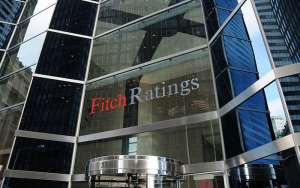
Ghana has secured a major credit upgrade, with Fitch Ratings raising the country’s Long-Term Foreign-Currency Issuer Default Rating (IDR) from ‘Restricted Default’ (RD) to ‘B-’, a shift that restores international confidence in the country’s financial stability.
The outlook has been classified as Stable.
The rating agency, in a statement released Monday, June 16, 2025, credited the move to Ghana’s progress in restructuring its external debt and restoring fiscal discipline. “Ghana ratified the memorandum of understanding on the restructuring of its bilateral official debt in January 2025, covering $5.1 billion,” the statement said, adding that only $2.6 billion of the country’s external debt remains unresolved.
The upgrade follows Ghana’s successful restructuring of $13.1 billion in Eurobond debt in October 2024. Fitch noted that risks of creditor holdouts are minimal and anticipates full external debt resolution by year-end.
Fiscal Consolidation on Track
Despite a primary deficit of 3.9% of GDP during the 2024 election year, Fitch forecasts improvement under the new administration. The government is targeting a 1.5% primary surplus in 2025. Fitch, however, expects a more modest surplus of 0.5% in 2025 and 0.9% in 2026, citing anticipated spending cuts.
Foreign-currency debt service is projected at $1.2 billion (1.2% of GDP) in 2025. With international reserves now at $6.8 billion and growing, Ghana is seen as better equipped to meet external obligations.
However, domestic debt remains a challenge, with interest payments forecast at 3.6% of GDP. That said, falling Treasury bill rates and plans to reopen the long-term bond market are expected to ease liquidity pressures.
Debt and Inflation Declining, Growth Holding Steady
Public debt is projected to drop to 60% of GDP by 2026, down from a peak of 93% in 2022, driven by strong GDP growth, a firming cedi, and fiscal consolidation. Inflation is also trending downward, expected to fall from 23% in 2024 to 15% in 2025, and to 10% in 2026. This is backed by a tight monetary policy, easing commodity prices, and currency gains.
The Bank of Ghana is expected to begin cutting its policy rate in July 2025.
Growth remains robust despite recent headwinds. Real GDP expanded by 5.7% in 2024, with 2025 and 2026 growth forecast at 4% and 4.5%, respectively, buoyed by agriculture, industry, and services.
Governance and Risk Outlook
Fitch assigned Ghana an ESG Relevance Score of ‘5’ for political stability, rule of law, and institutional strength. While this reflects a tradition of peaceful democratic transitions, the agency also flagged ongoing governance and corruption challenges.
The Stable Outlook reflects balance: Fitch cautioned that renewed fiscal slippage or external shocks could threaten the rating, while stronger reform delivery, reserve growth, and consistent debt service could prompt further upgrades.
Fitch confirmed that no discretionary adjustments were made to the model outcome, emphasizing a data-driven basis for the ‘B-’ rating. Ghana’s Country Ceiling was also set at ‘B-’, reflecting no major restrictions on foreign exchange access for private sector debt servicing.
The upgrade places Ghana back into active consideration by international investors, albeit still within the high-risk, speculative category. Nonetheless, it signals a turning point in the country’s post-default recovery path.


